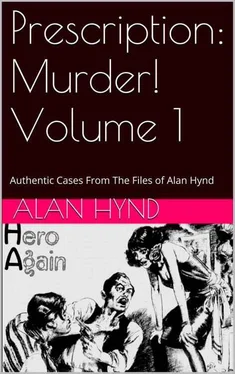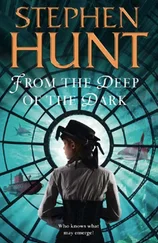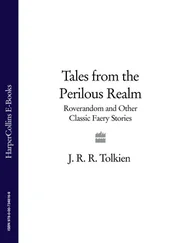It hadn’t taken Gilligan long, of course, to become some-thing of a fixture at Paddy’s saloon. Being a boastful man, he regaled Paddy and some of the barflies of stories of why Big Jim Archer had failed as a husband and why he himself was such a success, going into all the details.
Then one night, some three years after his marriage to Sister Amy, Gilligan walked into Paddy’s a man with terror in his face.
“Good God, Mike,” said Paddy, “you look like you’ve seen a ghost.”
“It’s worse than that, Paddy. I’ve just seen somebody makin’ a ghost.”
“Whadda you mean?”
Gilligan had been hitting it up before he came into Paddy’s and was about two sheets to the ozone. Now, though, as if suddenly realizing that he had let out something that should never have been mentioned, he clammed up. Looking at a shot Paddy had poured for him, he shoved it back, without a word, and hustled out of the joint.
“I wonder what he meant by what he just said?” one of the barflies could hear Paddy muttering to himself. Paddy thought for a while, then shrugged and went back to pouring booze for the customers.
Two nights later, that hearse was at Sister Amy’s again. When Paddy’s opened in the morning, the word was there be-fore the first spigot was turned on: Brother Gilligan had conked out during the night. Heart attack.
Sister Amy, always a lady who looked ahead, had Gilligan’s successor all lined up, a classy-looking gentleman answering to the name of Harold Q. Knight, who had been in residence for several months now.
Knight was a smallish man of about fifty, with very white skin, very red lips, and jet black hair that the other residents were certain had been dyed. Nobody knew where he had come from and, as he passed the other residents at any hour of the day or night, he was always quot-ing to himself from a book of poetry he carried.
On the night of the day that Sister Amy’s seventh husband had been buried, one of the residents, a new arrival named Charles W. Andrews, happened to be passing Sister Amy’s bedroom when he heard the voices of Sister Amy and Harold Q. Knight.
“Why I asked you to come into my room,” Andrews could hear Sister Amy saying to Knight, “was I thought maybe we could get together.”
“I don’t quite understand,” Knight replied. There was silence, then Andrews heard Knight saying: “But why are you taking your nightgown off?”
“Can’t you guess, Mr. Knight?”
“Why, no.”
“I’m a woman,” Sister Amy was saying, “and I no longer have a husband. You are a man and you do not have a wife. We can have a lot of fun together.”
“Sister Amy,” Knight said, “I thought you knew.”
“Knew what?”
“That I prefer men to women.” There was a stony silence. Then Andrews heard Sister Amy say in the terminology of the day,
“You mean you’re a fairy?”
“Well,” replied Knight, “I guess you can call it that.”
It wasn’t long afterward when Knight left in the night.
All this time, of course, Mike Toughy had been biting his nails and tearing out his hair because The Hartford Courant, not want-ing to find itself without a press to print on, had admonished him to lay off Sister Amy. Sister Amy had, of course, cut down on that one-a-month hearse call. But the old boys and girls were still going away in the night.
Sister Amy, who had, up to now, as she began her seventh year operating The Home, always appeared in The Home starched out in a nurse’s white uniform and appeared on the street in regular pedestrian attire. Now, though, for street wear, she appeared in the semi-religious garb of the Quaker, flowing gray cape and little gray bonnet. As she minced along the streets of Windsor, out purely for exercise and air, she was never without her Bible, glancing at it as she walked, then quoting it as she looked skyward with a holy light in her eyes.
Our girl sure knew what she was doing. Some citizens re-garded her as something of a nut. Others respected her as a devout little character. But nobody, nobody but Mike Toughy, had the slightest idea that she was one of the great killers of criminal history.
It was along about now that Sister Amy, in her middle forties, entered that phase that women call change of life. With the normal woman, sex becomes pretty important. With Sister Amy, the demand was out of this world. To make matters worse, there wasn’t a stalwart male on the premises. So Sister began to pay for it. Windsor was filled with stalwart young workmen, plumbers and carpenters and jacks of all trades. So now there was always a leak that developed some-where in The Home, after dark, and a plumber called to plug it up.
One day, Mike Toughy happened to be lifting a few in Paddy’s saloon when who walked in but Charley Andrews, the old boy who had heard that dialogue between Sister Amy and the gay resident. Toughy and Andrews happened to fall into conversation and when Mike heard the story of how Knight had conked out so quickly after not being able to rise to Sister’s demands, he began to throb with suspicion again.
So Mike Toughy, without his paper being any the wiser, decided to play for all or nothing. He scouted around Hart-ford until he found an old couple, smart folks in their sixties named Flanagan, and he coached them in the part they were to play in a lethal plot.
A few days later, then, Mr. and Mrs. Michael Flanagan appeared at the front door of The Archer Home.
“We’re from Massachusetts,” Flanagan said to Sister Amy, “and we’ve heard about your wonderful home.”
“Come in,” said Sister Amy. The Flanagans looked like prosperous people and Sister Amy sat there for quite a while, sizing them up and feeling them out. The Home, she divulged, was all filled but she’d be glad to put them on the waiting list.
“Oh,” said Flanagan, uttering words that Toughy had put in his mouth, “isn’t that too bad you can’t take us right away. Now we’ll have to hunt around for someplace else because we want to get into a Home somewhere right away.”
“Yes,” piped up Mrs. Flanagan. “And money is no object.”
The Flanagans were to say later that that crack of the little woman’s was like throwing fuel on a dying fire.
“Oh,” said Sister Amy, “I just remembered: there will be two vacancies here in a week or so.”
“Oh? You have residents who are very ill?”
“Yes. Two cases of heart trouble, poor souls.”
“Are they very ill?”
“They’re unaware of what’s wrong with them, God bless them.”
“We’ll be back,” said Flanagan. “We’re staying with relatives down in New York.”
When the Flanagans told Toughy about the vacancies, Mike was afraid he’d have two murders on his conscience. So he had the Flanagans go right back and tell Sister Amy they’d changed their minds.
Unbeknown to Mike, though, there was another couple, people named the Chester Watsons, who had popped up at the Bliss home, of all places, asking the two old maids what they knew about the Archer place
“We’re looking for some place to spend our last years,” Mrs. Watson told Mabel Bliss, “and we’ve heard a lot about the Archer Home.”
Mabel Bliss, having been told by Mike Toughy that Sister Amy would have the law on anybody who said a bad word about her, was afraid, unfortunately, as it turned out, to open her mouth. And so she and her sister saw the Chester Watsons walking across the street, rapping on the front door of The Home, and being graciously received by Sister Amy.
Two nights later, not one but two residents of The Archer Home left in boxes. One dead one was an old lady; the other was Brother Andrews.
And that did it, the double departure in the gloom of the night. There was room now for the Watsons. When the Bliss sisters dropped the word to Mike Toughy, he got busy. Toughy had always thought that Sister Amy had learned about those four bodies he had had dug up by spotting him when he had visited the Bliss home originally and somehow having him shadowed when he went to the cemetery at nights. Now, though, he to take his chances.
Читать дальше












